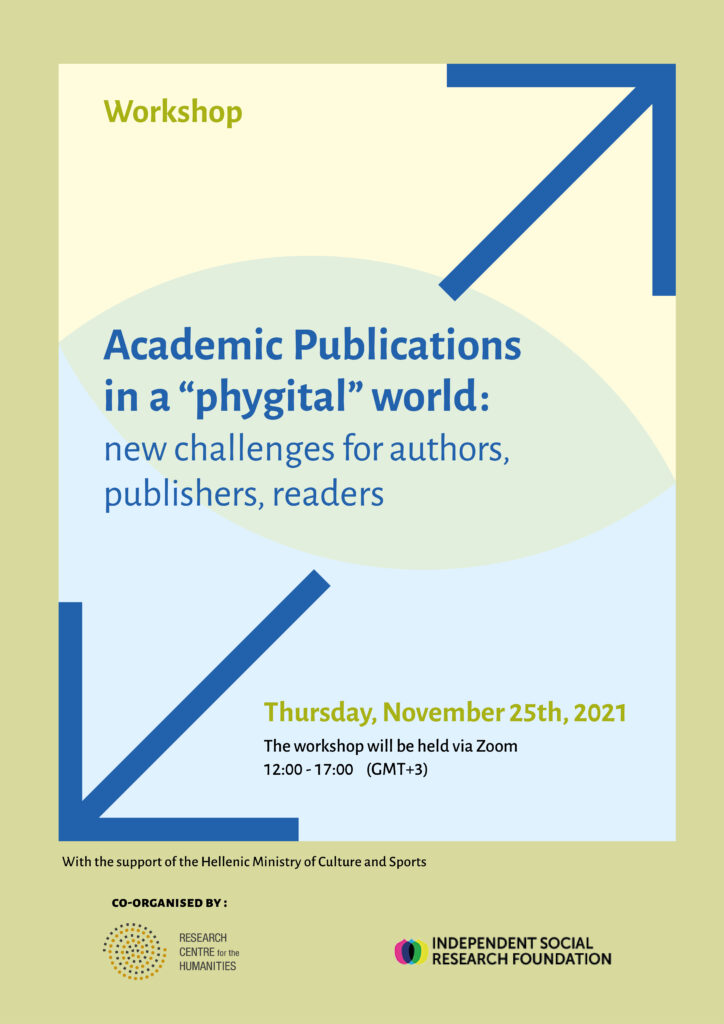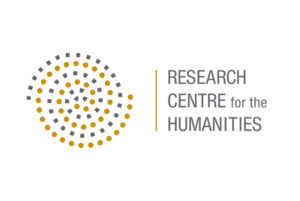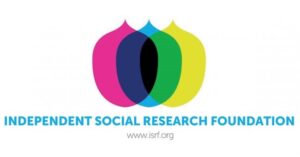November 25th, 2021
The workshop will be held via Zoom[1].

Co-organised by
the Research Centre for the Humanities and the Independent Social Research Foundation.
 |
 |
With the support of the Hellenic Ministry of Culture and Sports.
Description:
The RCH’s Digital Library team aims to explore new tendencies in digital publishing, with specific concern about the accessibility to high quality publishing for younger academics.
We wish to share our thoughts about expanding the limits of an academic publication by taking advantage of the new possibilities unfolding in a digital environment. The aim is to discuss best practices and standards for open-access academic monographs in the fields of the Humanities and Social Sciences. Academic publishing is one of the world’s big businesses and as such is shaped by big players, funding, politics, and technology. The question is whether it is possible to create inroads to this reality by setting up a sustainable, non-profit, open-access publishing enterprise which will endorse a “fair-trade” approach to academic publishing and will aim at creating a community of readers rather than a market for subscriptions.
***
Panel 1: Open Access and new, feasible publishing models
Digital technology has been transforming the field of academic publications during the last couple of decades. It is reforming our reading habits, our research practices, but also the ways of production, distribution, and accessibility of the publications. The vastness of the web could promise the open distribution of scientific knowledge to everyone. However, it seems that when it comes to OA publications, especially monographs, these still do not claim the same range of distribution as the “traditional”, paywalled publications of major publishing houses, while they are also not usually acknowledged as equally prestigious or of the same quality and academic value.
While there is a growing tendency to move closer to OA and FAIR principles in academic publishing, there is a need to address the lack of a structured legal framework that would ensure the sustainability and legitimization of these publishing practices.
How could we develop a framework that could:
- safeguard the copyright and the intellectual labour of the writers?
- establish an assessment process that would ensure the high quality, scientific integrity, and prestige (and thus legitimization) of the publications?
- ensure the acknowledgement and, moreover, the compensation for the intellectual labour provided by both the writers and the assessors?
- form stable and viable funding policies that would solidify the OA publishing process as a sustainable model of academic publications?
- develop a wide network of institutions adhering to common principles that would aim to the promotion of open, sustainable, and high-quality publishing practices?
Panel 2: Digital library, community, and phygital space
By building such a model of OA, sustainable and non-profit publications, there is potential of developing a new paradigm of academic publishing that will not be based on business, profit-rendering practices, but on the premise of the commons. This new paradigm would aim at building a community of readers, researchers, and institutions, rather than serving a specific “market”. In this regard, digital libraries should not be limited to operating as remote repositories for OA material; new technologies provide opportunities for creatively handling the special topology of digital space toward forming new kinds of “places” where people can “meet” and work together.
Similarly, traditional libraries have been serving more complex purposes than just storing or lending material. They form communities of researchers and readers, and thus highlight that research and reading are not necessarily individual practices. In our increasingly digital everyday reality, especially under the recent circumstances born by the pandemic, it is more and more clear that physical spaces still retain a crucial role. In thinking about the relationship between the digital and the physical, the question arising is how digital publishing technologies can build spaces that not only resemble or digitally duplicate those created by traditional libraries. Instead, there is a need to reflect on how to practically extend and enrich both the reading and research experience and the library’s social significance in forming phygital communities between readers, researchers, and institutions. In order to move towards this direction, we need to reclarify some issues regarding this transition from print to digital.
In this regard, some questions that arise, are the following:
- What exactly constitutes the decisive historical shift within the broader transition of reading experience, from traditional, print reading experience to the digital reading experience?
- How does reading (or publishing) fit in a space regulated by algorithms? What does it mean for a text, or any cultural artifact, to be distributed, exhibited and also “consumed” within an algorithmic environment?
- Is it possible to create an interactive, participatory space that moves away from just an online repository and closer to the concept of the “library”, where readers can share their collective reading experiences similarly to the traditional libraries, but within the digital field?
- How can the digital be combined with the physical space in forming communities on research and reading?
- In short, how are our reading habits changing in the context of this tension between the digital and physical and what are the epistemological consequences of these shifts?
[1] If you are interested in attending the workshop, please contact info@rchumanities.gr or abozika@rchumanities.gr.
Program:
12:00-12:10 | Welcome and Introduction: Ada Dialla
Panel 1: Open Access and New, Feasible Publishing Models
(12:10-14:10 GMT+3)
Chair: Anna Karakatsouli
12:10-12:30 | Chris Muellerleile, Navigating the Contradictions of Open Access
12:30-12:50 | Giannis Tsakonas, The Evolving Scholarly Communication Field and the Role of Research Libraries
12:50-13:10 | Victoria Tsoukala, Open Access and Feasible Publishing Models: the EU Perspective
13:10-13:30 | Klaus Thoden, Looking back: 11 years of Edition Open Access
13:30-13:40 | Commentator: Lars Cornelissen
13:40-14:10 | Discussion
14:10-14:40 | Break
Panel 2: Digital library, Reading and Community Between Physical and Digital Space
(14:40-16:40 GMT+3)
Chair: Kostas Gavroglu
14:40-15:00 | Mitsos Bilalis, Reading and Writing within Digital Regimes of Time
15:00-15:20 | Petros Petridis, Liking Myself: Readings, Rankings and Filter Bubbles in the Context of Algorithmic Cultures
15:20-15:40 | Athena Bozika, The Materiality of Reading: Print nostalgia, Digital Frustration and Hybridity
15:40-16:00 | Angelos Varvarousis, Commons and Collective Reading Experiences in Phygital Environments
16:00-16:10 | Commentator: Despoina Valatsou
16:10-16:40 | Discussion
16:40 | End of workshop
Participants (listed alphabetically):
Mitsos Bilalis, Assistant Professor of Theory and Technology of Historical Information at the Department of History, Archaeology, Social Anthropology, University of Thessaly
Athena Bozika, Coordinator at the RCH Digital Library, MA Political Science and Sociology, National and Kapodistrian University of Athens
Lars Cornelissen, Academic Editor at the Independent Social Research Foundation
Ada Dialla, President of the Board at the Research Centre for the Humanities, Professor of Russian and European History at the Department of Art History and Theory, Athens School of Fine Arts
Kostas Gavroglu, Founding Member of the Research Centre for the Humanities, Professor Emeritus of History of Science, National and Kapodistrian University of Athens
Anna Karakatsouli, Associate Professor of European History and Culture, Department of Theatre Studies, National and Kapodistrian University of Athens
Chris Muellerleile, Senior Lecturer of Economic Geography at the Department of Geography, Swansea University
Petros Petridis, Assistant Professor of Anthropology at the Department of Social Anthropology, Panteion University
Klaus Thoden, Visiting Consultant at Max Planck Institute for the History of Science
Giannis Tsakonas, Acting Library Director at the University of Patras, LIBER Executive Board
Victoria Tsoukala, Policy Officer / Seconded National Expert, European Commission, Directorate General for Research
and Innovation, Unit Open Science
Despoina Valatsou, Administrator at the Research Centre for the Humanities, Post-doctoral Researcher and Lecturer at the Athens School of Fine Arts
Angelos Varvarousis, Adjunt Professor at the Hellenic Open University, Post-doctoral Researcher at the Autonomous University of Barcelona
Scientific Organizing Committee:
Mitsos Bilalis, Assistant Professor of Theory and Technology of Historical Information at the Department of History, Archaeology, Social Anthropology, University of Thessaly
Anna Karakatsouli, Associate Professor of European History and Culture, Department of Theatre Studies, National and Kapodistrian University of Athens
Eleni Stambogli, Historian, Publisher, Member of the Board of the Research Centre for the Humanities
Program (PDF)
Blurb (PDF)
